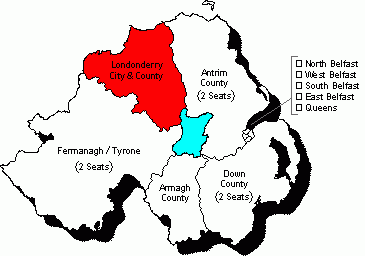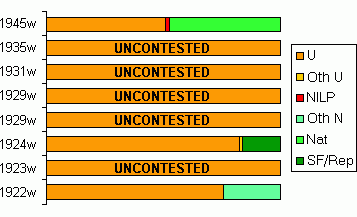

 |

|
| |
|
|
Tuesday April 1, 2025
|

|

|
| Map and diagram by Conal Kelly | |
Located in the north-west corner of Northern Ireland, this constituency incorporated all of county Londonderry, including the city of Londonderry. Established under the terms of the Government of Ireland Act 1920, the constituency replaced the Westminster seats of North Londonderry, South Londonderry, and Londonderry City. Between 1922 and 1949 the constituency was represented by just two MPs, both members of the Unionist Party. The longest serving of these was Sir Ronald Ross, who was first elected in 1929 and continued to represent the constituency until his appointment as Northern Ireland Government Agent in London in 1951. The general elections of 1923, 1929, 1931, and 1935, as well as the 1929 by-election all went uncontested. The declared winner in each case was the sole Unionist nominee. The constituency had the lowest turn-out across Northern Ireland in the 1922 and 1924 general elections.
See also election results for Londonderry 1950-1970 and 1973-1982.
| U | Ind U | NILP | Ind N | Nat | SF | |
| 1945w | 50.7% | 1.9% | 47.4% | |||
| 1935w | * | |||||
| 1931w | * | |||||
| 1929w | * | |||||
| 1929w-b | * | |||||
| 1924w | 82.9% | 1.4% | 15.8% | |||
| 1923w | * | |||||
| 1922w | 75.7% | 24.3% |
* The only candidate nominated for the 1923 General Election was Unionist Sir Malcolm Macnaghten. The only candidate nominated for the 1929 By-Election and the 1929, 1931, and 1935 General Elections was Unionist Maj. Ronald Ross. In each instance the sole candidate was therefore duly elected without a contest.
Unionist majority: 2,653; electorate: 89,979; votes cast: 88.1%
In this his fifth election in Londonderry, Ross would have the novelty of facing not one but two electoral opponents. Denis Cavanagh was standing as an Independent Nationalist candidate and Mitchell Gordon was representing the Northern Ireland Labour Party (NILP). In what was one of the closest results of the election, Cavanagh secured over 47% of the vote and came within 2,600 votes of toppling Ross.
Unopposed Unionist Candidate.
Standng for the fourth time in Londonderry, Ross once again had the luxury of a clear field and was duly elected unopposed. Londonderry was one of seven seats that went uncontested across Northern Ireland in the 1935 election.
Unopposed Unionist Candidate.
As was the evolving custom, there was just one candidate for the Londonderry seat in 1931. The Unionist Party's Ross was returned unopposed for the thrid time.
Unopposed Unionist Candidate.
As was the case in the by-election four months earlier, Ross did not face any opposition in the 1929 general election. Ross was duly elected without a contest once more. Londonderry was one of four seats that went uncontested across Northern Ireland in the 1929 election.
Unopposed Unionist Candidate.
Following Macnaghten's
appointment as a High Court Judge in 1928, a by-election was called for
January 1929. Maj. Ronald Ross was selected as the Unionist Party candidate.
As so often was the case during this period, there was no other nominee and
Ross was duly elected unopposed.
Ross stood unsuccessfully against as the Conservative candidate for the English
constituency of Seaham in both the 1923 and 1924 general elections. His
father, John Ross, had held the Londonderry City seat between 1892 and 1895.
Unionist majority: 25,006; electorate: 63,087; votes cast: 59.1%
In this, the third
election in as many years, Macnaghten would face two new opponent in 1924.
Sinn Fein were fielding their candidate James McKee and Independent Unionist
William Galt was also contesting the election. Despite some concern that the
unionist vote would be fractured, Macnaghten won comfortably, securing just
under 83% of the vote and increasing his majority to 25,000. At 59.1%,
Londonderry had the lowest turn-out across Northern Ireland in the 1924
general election.
MacWhinney's wife, Linda Kearns MacWhinney, was elected to Seanad Éireann on
the Industrial and Commercial Panel in April 1938.
Unopposed Unionist Candidate.
Unlike 1922, Macnaghten was the sole candidate nominated in Londonderry in 1923 and was duly elected without a contest. Londonderry was one of nine seats that went uncontested in the 1923 general election in Northern Ireland. The sole nominee (and hence winner) in each instance was the Unionist candidate.
Unionist majority: 20,882; electorate: 63,505; votes cast: 63.9%
This was the first election
for the newly established Londonderry constituency. The new constituency replaced
the North Londonderry, South Londonderry, and Londonderry City constituencies that
had been used in the 1918 election. This was one of only two constituencies where
an actual electoral contest took place in 1922. Malcolm Macnaghten, who had
earlier been elected to represent North Londonderry in a June 1922 by-election,
would represent the Unionist Party. His opponent was his Dublin based cousin and
Independent Nationalist, Edmund Macnaghten. This MacNaghten familial rivalry
resulted in a convincing victory for Malcolm, who romped home with 75% of the
poll and a majority over 20,000. At 63.9%, Londonderry had the lower turn-out
of the two contested constituenies in the 1922 general election.
Edmund MacNaghten had unsuccessfully contested the English seat of Henley as a
Liberal candidate in the 1918 general election.
See also:
Results from 1922 to 1949 for each seat: East Belfast | North Belfast | South Belfast | West Belfast | Antrim | Armagh | Down | Fermanagh and Tyrone | Londonderry | Queens University
Other sites based at ARK: ORB (Online Research Bank) | CAIN (Conflict Archive on the INternet) | Northern Ireland Life and Times Survey
Your comments, please! Send an email to me at nicholas.whyte@gmail.com.
Conal Kelly, 10 October 2007.
|
|
Disclaimer:©
Nicholas Whyte 1998-2004 Last Updated on Wednesday, 12-Jan-2005 12:12
|